Nixie tube is a cold cathode lamp filled with gas (typically neon with some argon at a low pressure, mercury is sometimes added for longer life). It is used for displaying numbers or other symbols. It has one common anode and multiple cathodes, whose shape forms individual characters. Applying voltage between the anode and one cathode, the respective cathode lights up (becomes surrounded by glow-discharge) and thus will display the character (digit). The principle is similar to that of neon glow lamps. Similar is also the light color - orange. For ignition of the nixie, about 150 - 200V is required, most commonly 170V.
Nixie were used primarily before the advent of other displays, such as LCD, LED and VFD displays. Now they are no longer manufactured
or fitted into factory-manufactured equipment. However, they are experiencing a renaissance and people like to return to them,
particularly for the construction of a retro design digital clocks. Some constructers mimic design of the time when nixies were actually used, but
there are also crazy anachronisms like clocks with blue or RGB LEDs used to backlight the nixies (!!!),
clocks controlled by human voice, clocks full of SMD components and so on.
A typical retro design includes traditional iron transformers, primitive logic circuitry like 7490, 7400 and 74141 nixie driver.
Anachronistic design usually involves switching power supply, switching inverter of anode voltage, LED backlight, multilayer boards
with SMD components, microprocessors (MCU) like AVR or PIC, DCF-77 or even GPS sync, remote contro, etc. :).
Some examples of nixie clocks:
Nixie clock with medium level of anachronism
Big nixie clock with medium level of anachronism
Traditional nixie clock without MCU - only with logic circuits
1970's TTL logic nixie clock
Although no longer in production, there's still huge stock of nixies. They can be found in different old devices, but also new, unused. Small types were produced in very large quantities. Nixie with digit height up to about 2 cm are quite common and can be found in huge heaps in old stocks, old measuring instruments and so on, or bought for few dollars. (Especially in post-Soviet countries there are vast new old stocks of nixies with no use.) Larger types (about 2.5 - 4 cm) are relatively rare and the largest (5cm or more) very rare. Such large types were not produced in large amount, as their use was not very wide. Now nixies are popular to construct nixie clocks. At the time of their production, however, nixies were rather used in measuring and computing equipment, as votmeters, multimeters, frequency counters, pulse counters, calculators and so on; their use for digital clocks was very rare and limited to special clocks and timers for lab, industrial and automation purposes.
On this page I have collected some nixie tube data. The table below shows an overview of the most common Soviet nixies. Note that the older types such as IN-1, IN-2, and IN4 have a lifetime of just 1000 h. Newer nixies as IN-8, IN-12, IN-14, IN-16, IN-17 and IN-18 have a specified lifetime of 2000 to 12 500 h. This is probably caused by the addition of mercury, which limits evaporation of the cathode material and cathode poisoning. The lifetime is still several times underestimated, it is a minimum guaranteed lifetime. With proper handling, of mercury-enriched nixie can serve without any problem more than 5 or even 10 years of continuous operation. Especially if all of the cathodes are used evenly and sufficiently often alternated. When used in clocks it is therefore possible to achieve greater durability, particularly in frequently changing digits (seconds), than in the nixie measurement equipment, where most of the time, when they're not active, showed all zeros. The old equipment, on the other hand, was used mostly in style of "switch on - use - switch off" and so equipment manufacturers did not think too much about how to prolong the nixie life. They sometimes used unnecessarily high currents. The datasheets sometimes even did not mention lifetime, because for a device you turn on, use and turn off (eg. Multimeter) it is not important. The first types of nixie had short life of around 1000 hours, the last ones 50,000 h, and if cathodes were used evenly and sufficiently frequently switched, it could be even 500,000 hours. However, this is 57 years and it has never really been tested :). It is necessary to note that the life expectancy especially of Soviet nixies is very conservative, and in fact can reach more than ten times the datasheet value. This is the "minimum operating life", which differs considerably from that of "average life" or "mean life". The minimum lifetime is the time during which a negligible percentage of units fails. In contrast, the average or mean life, which is today used for measuring for example the life of incandescent bulbs, flurescent lamps or displays, is the time after which half of the units fails.
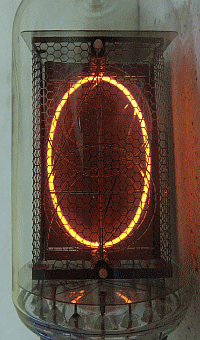
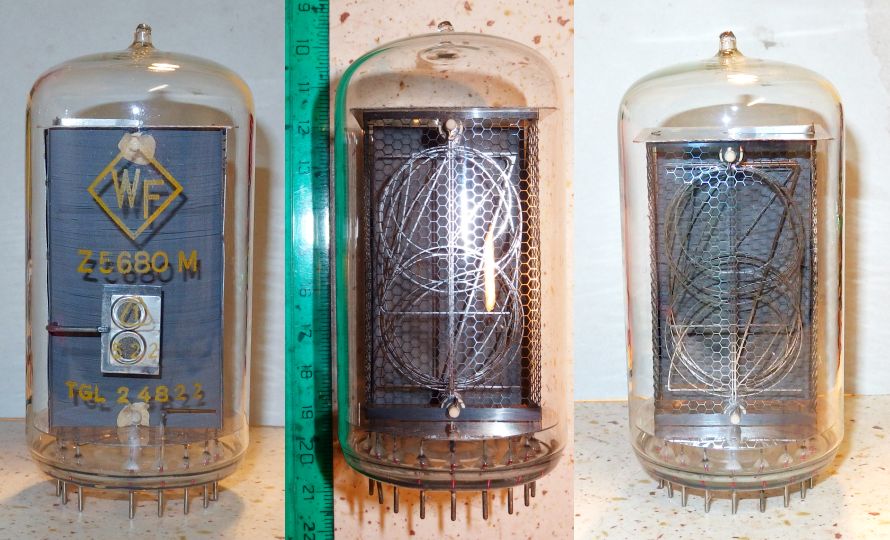
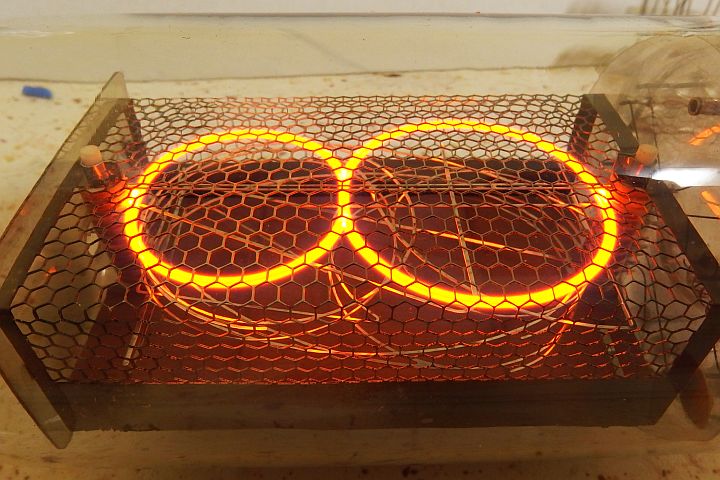
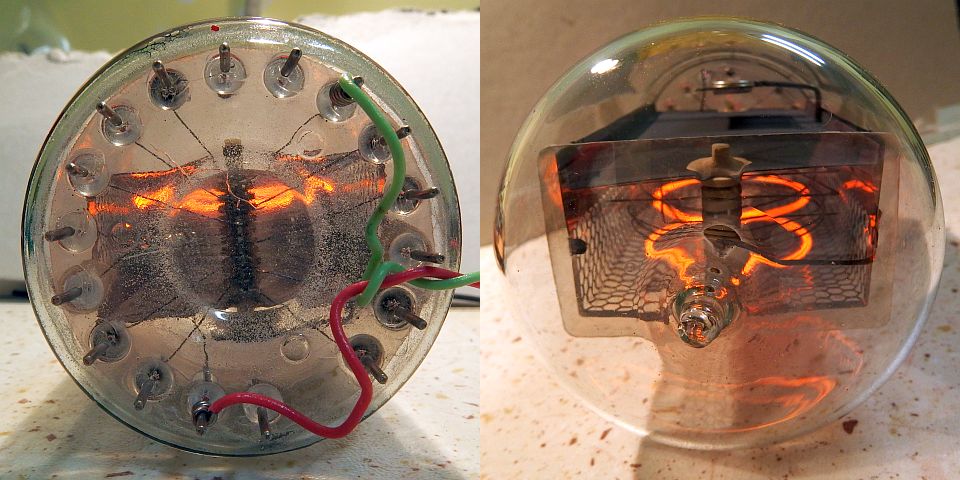
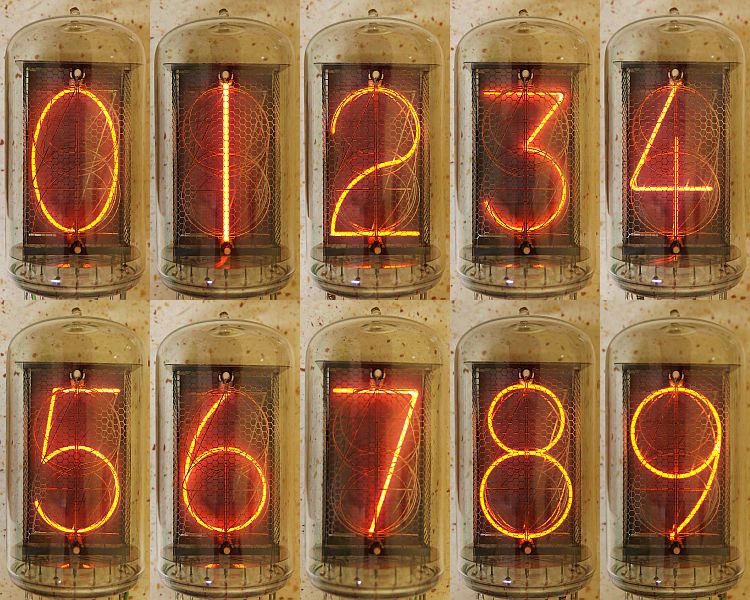
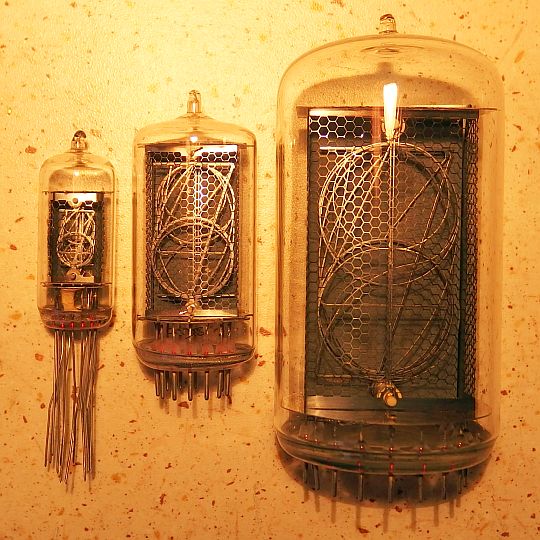
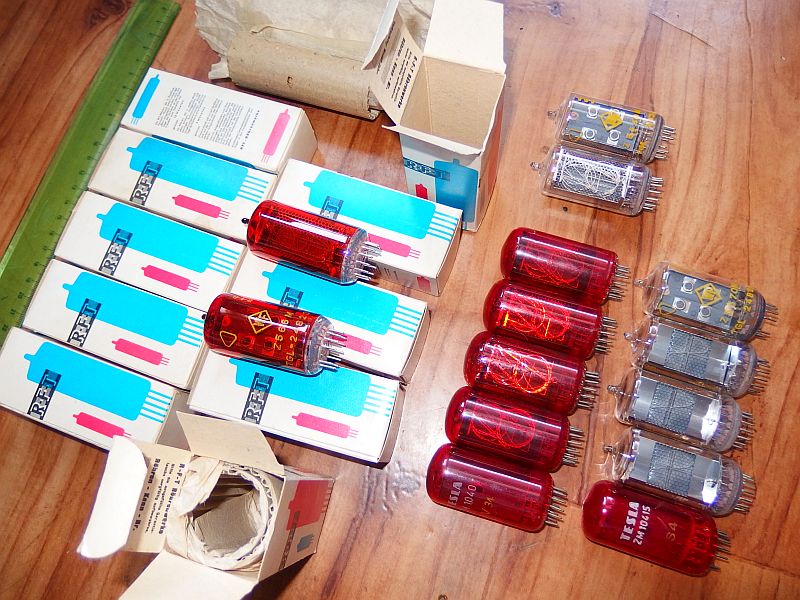
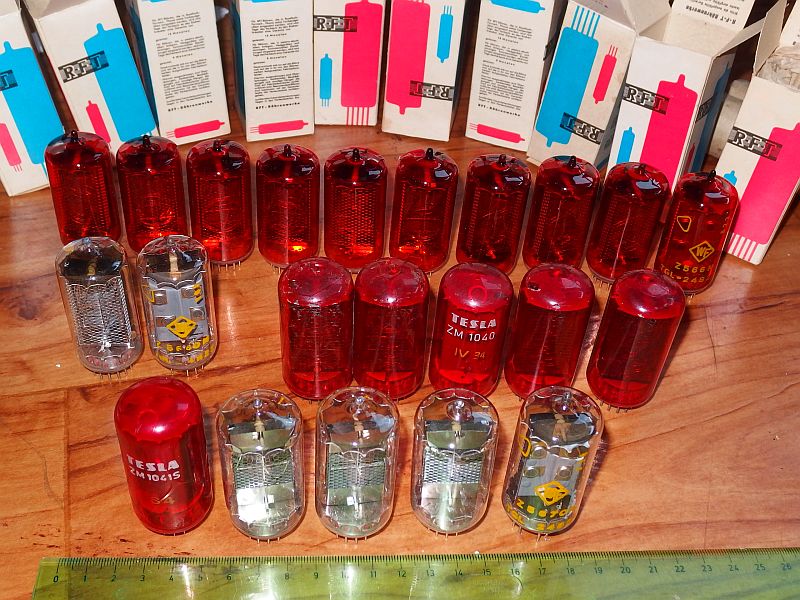
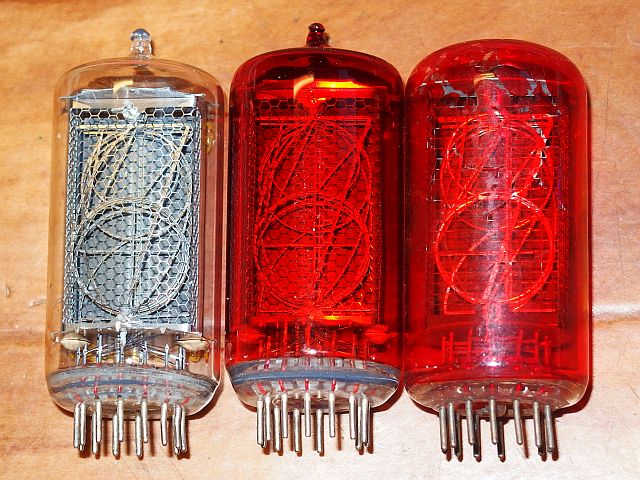
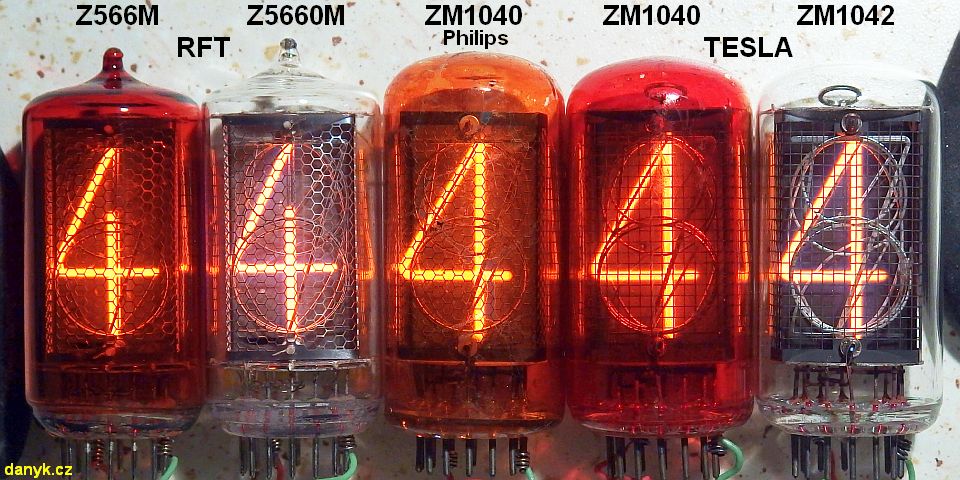
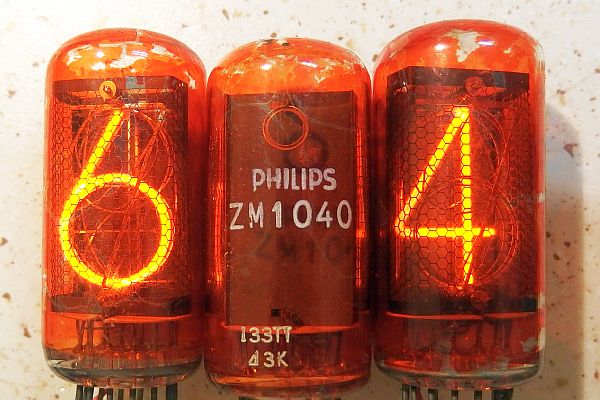
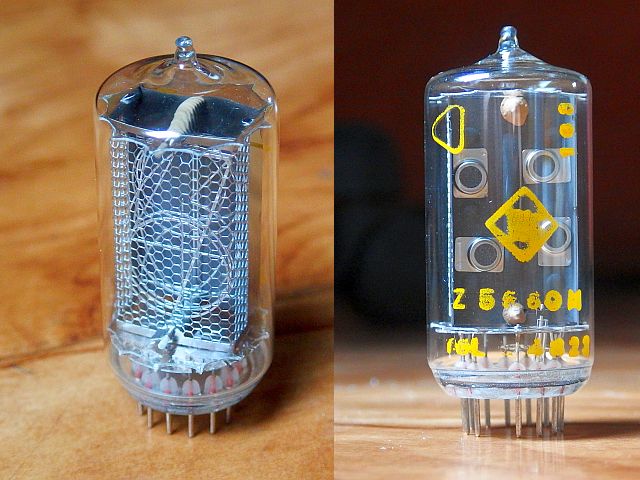
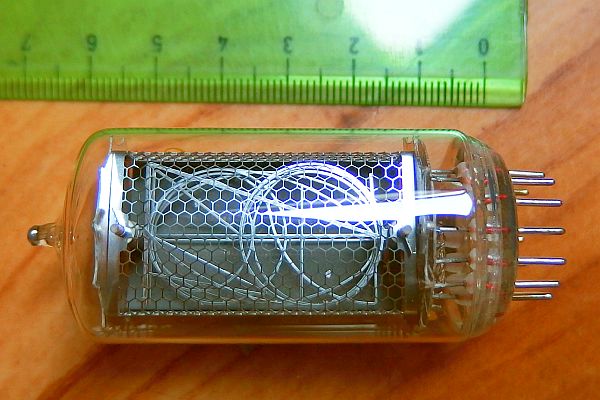
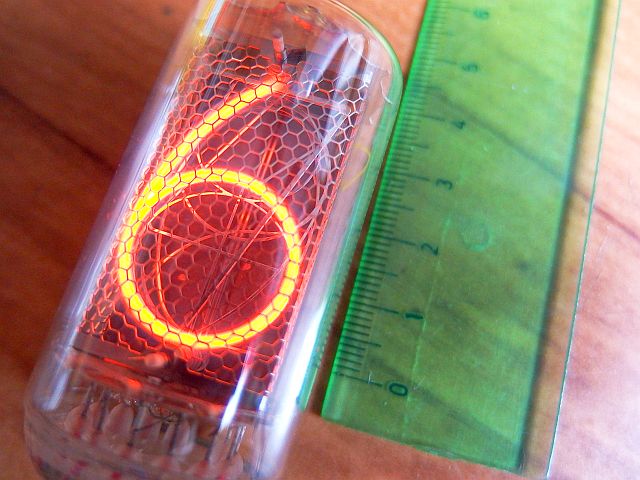
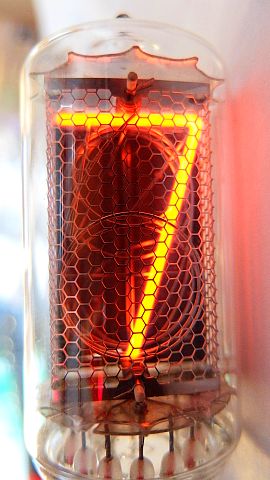
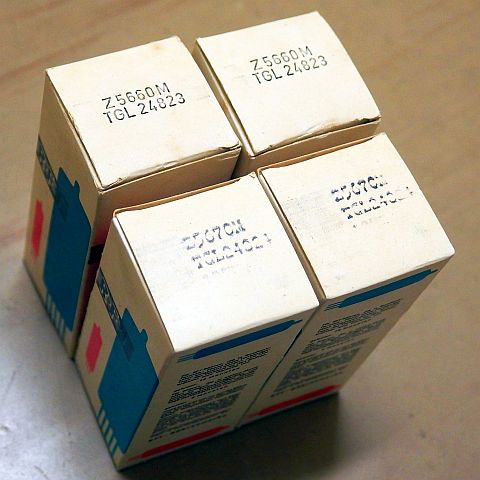
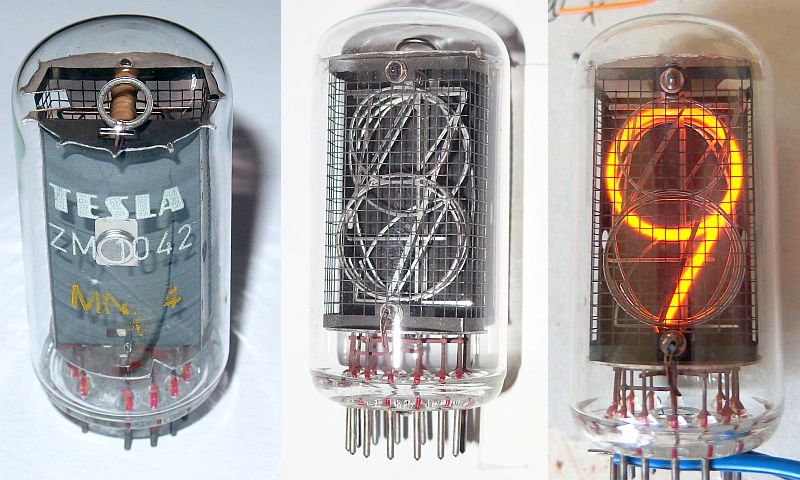



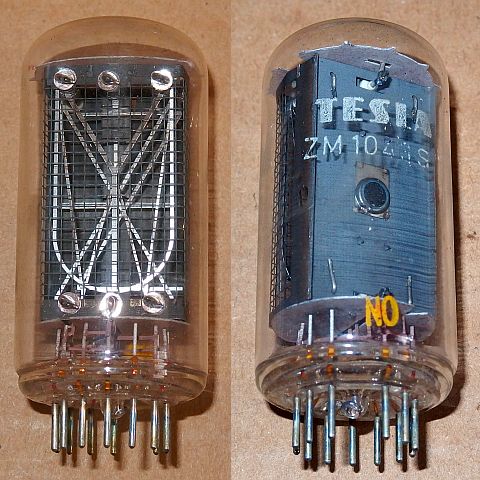
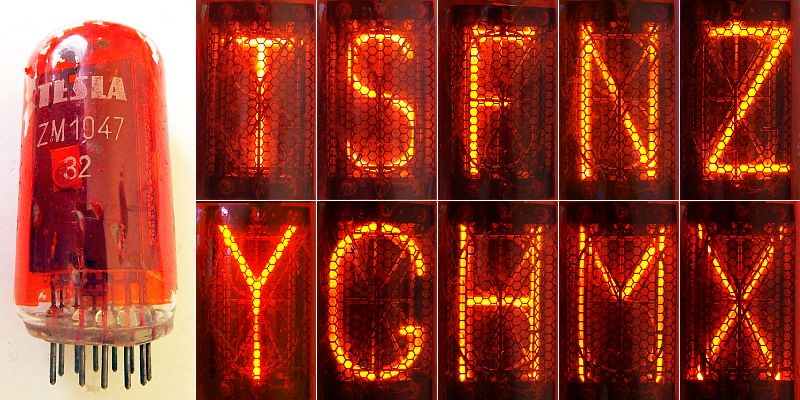
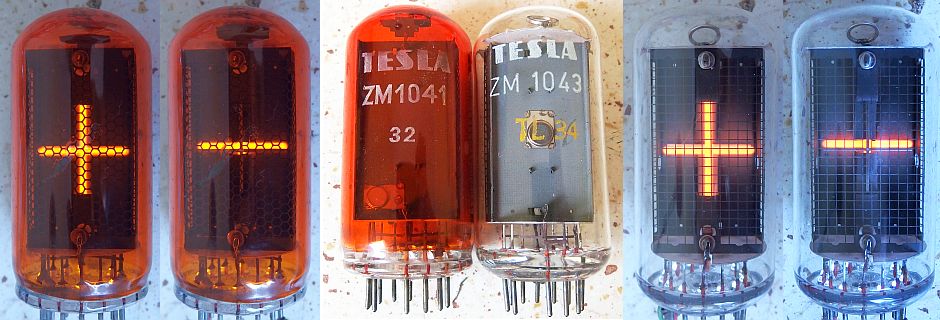
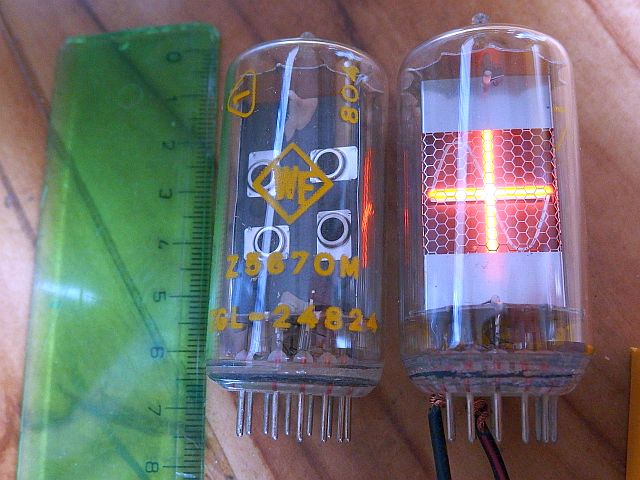
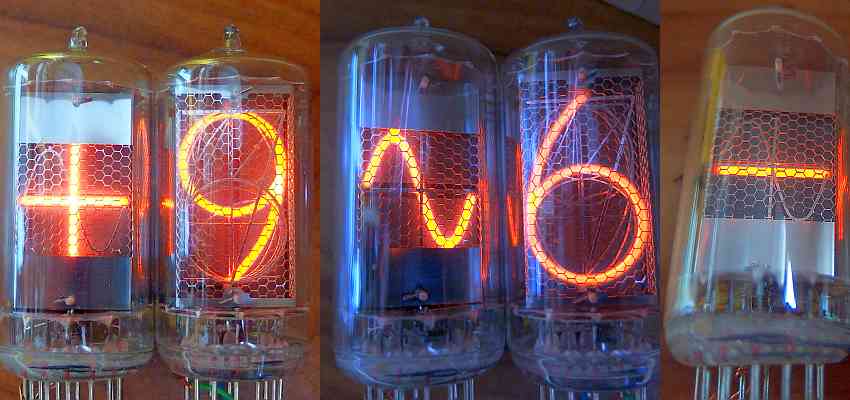
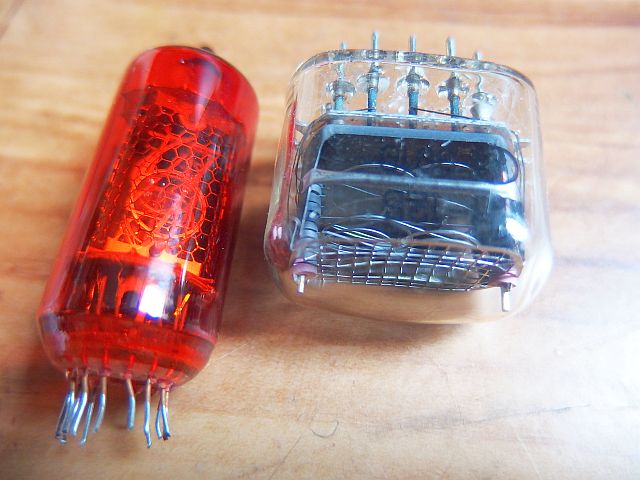
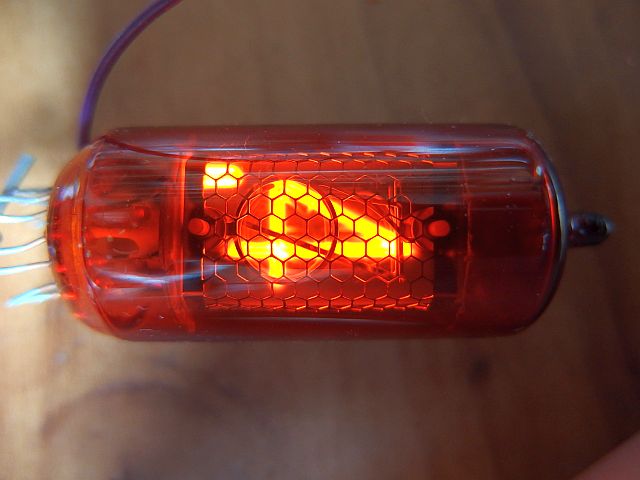
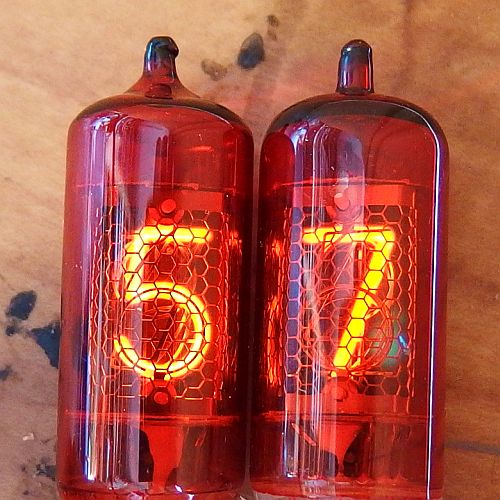
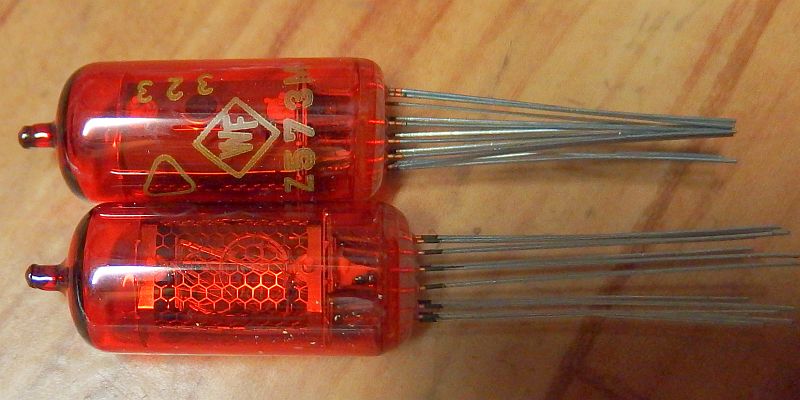
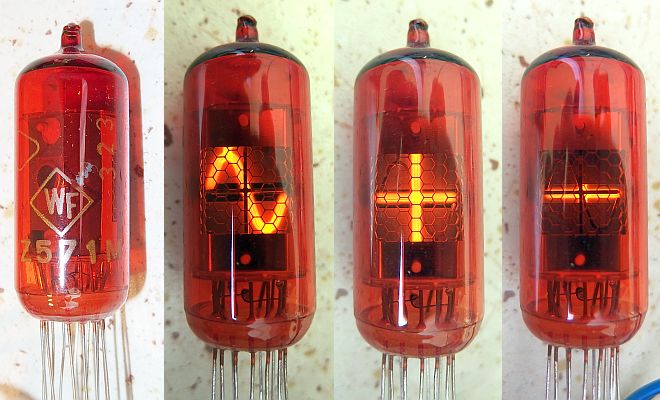
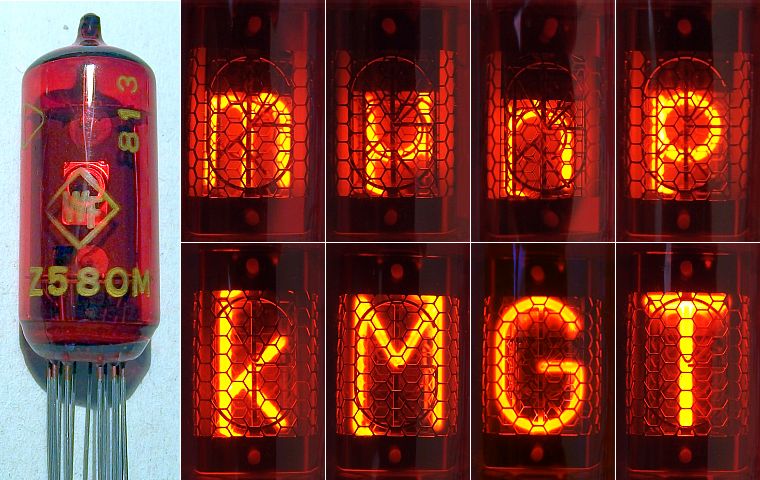
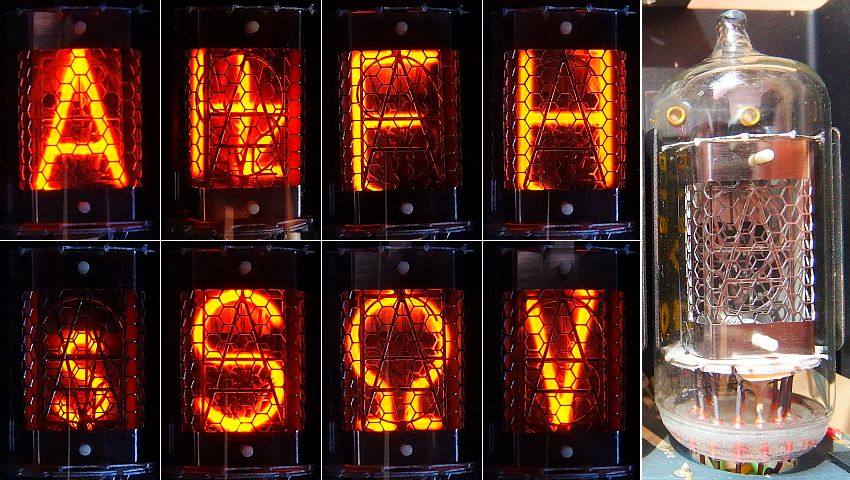

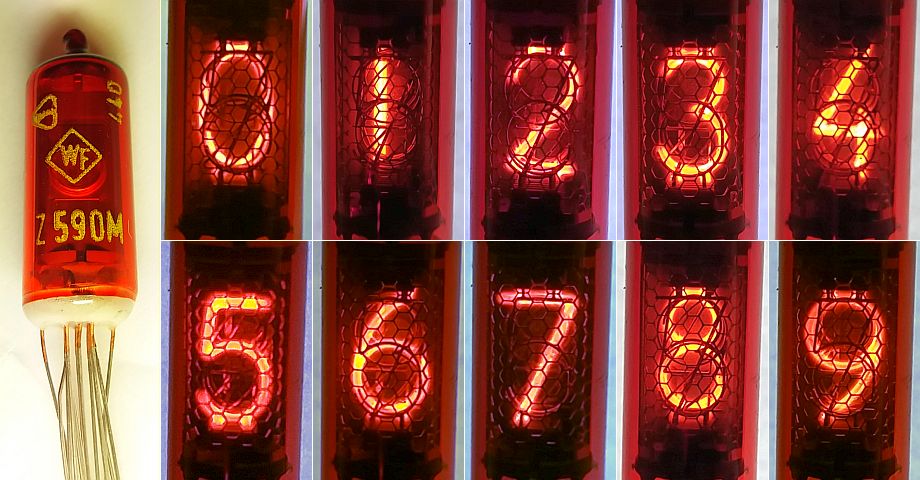
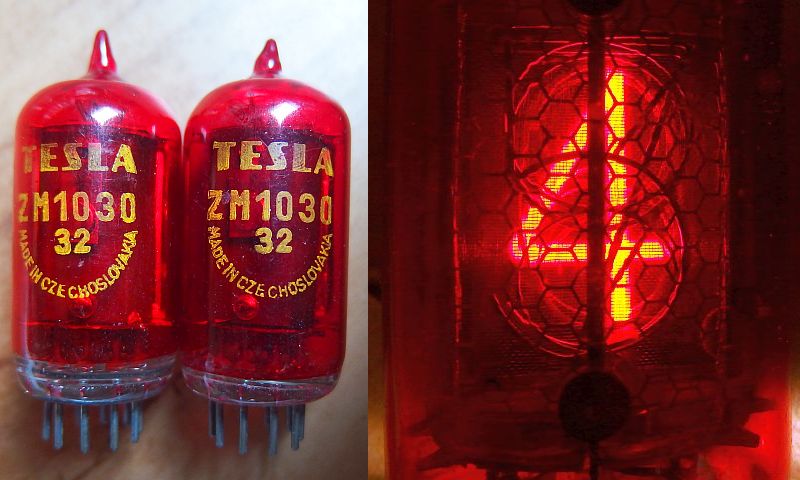
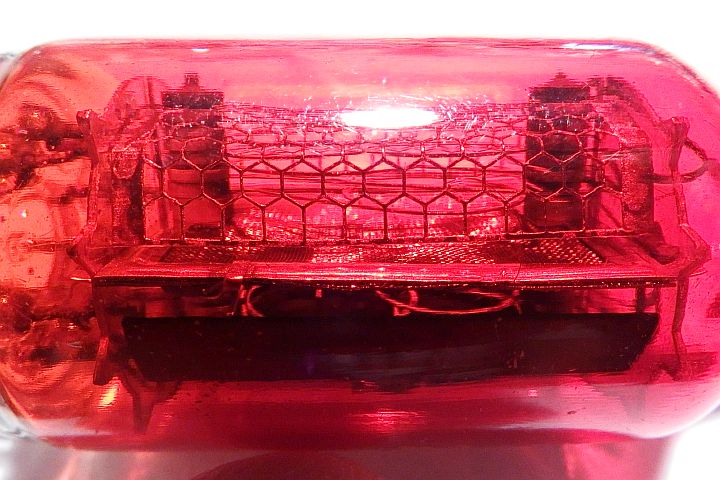
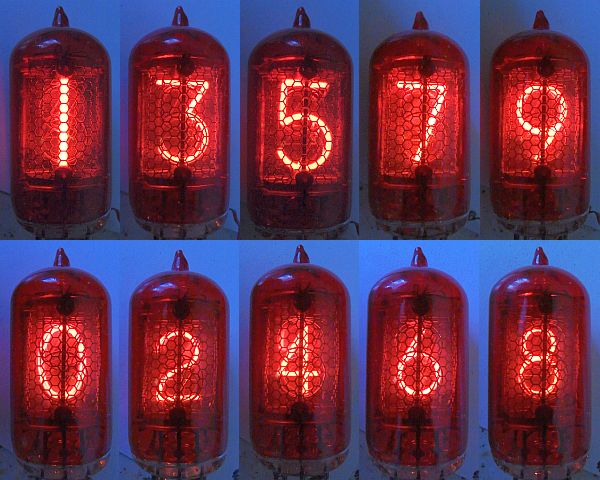
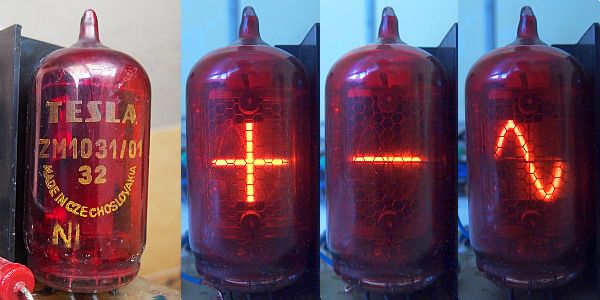
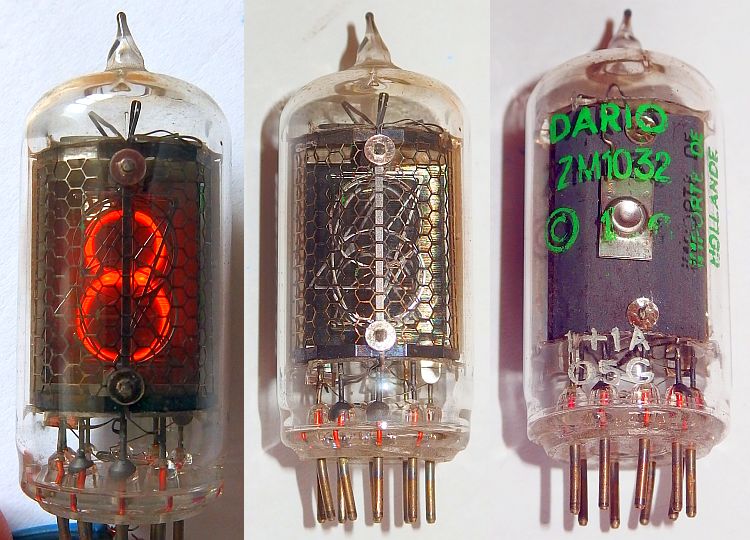
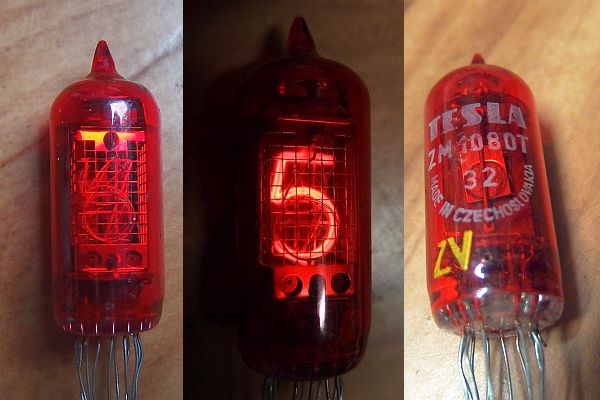
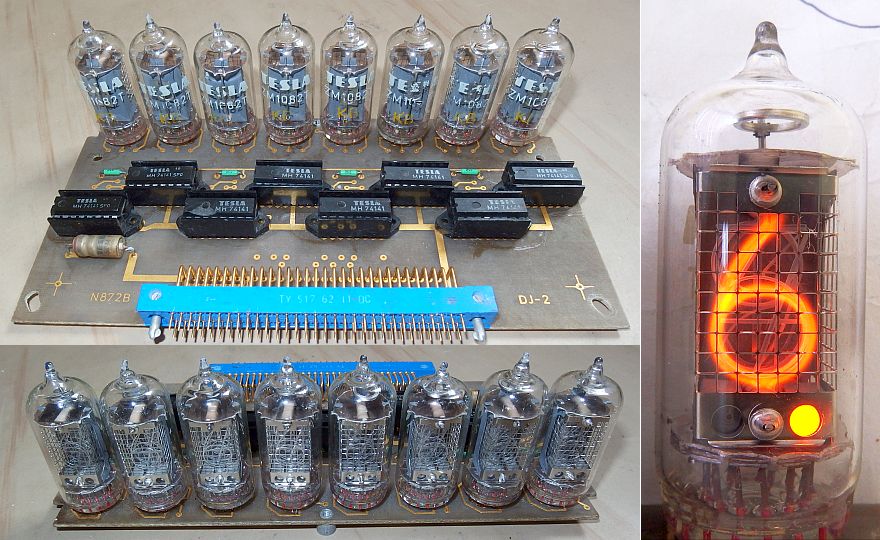
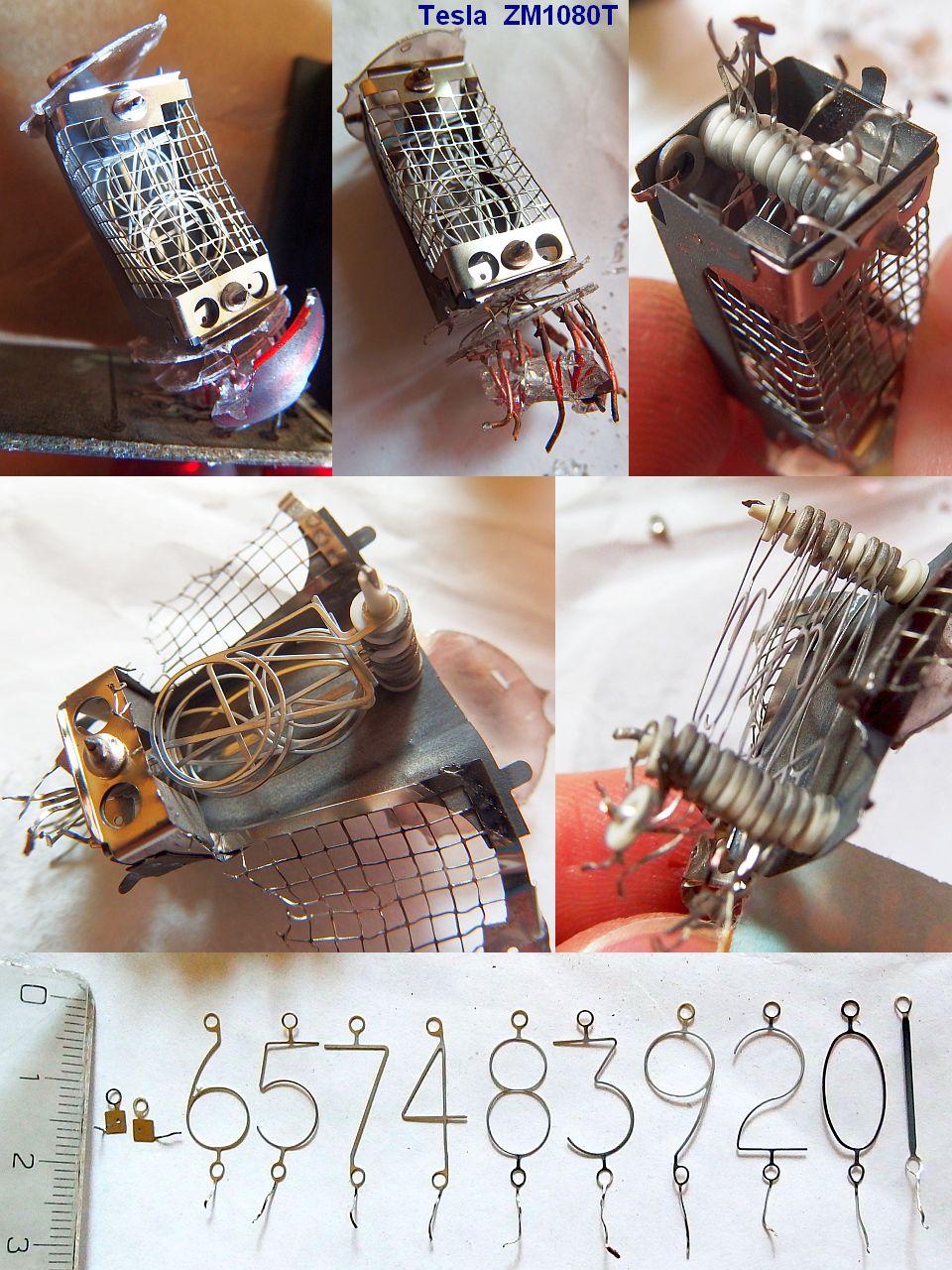
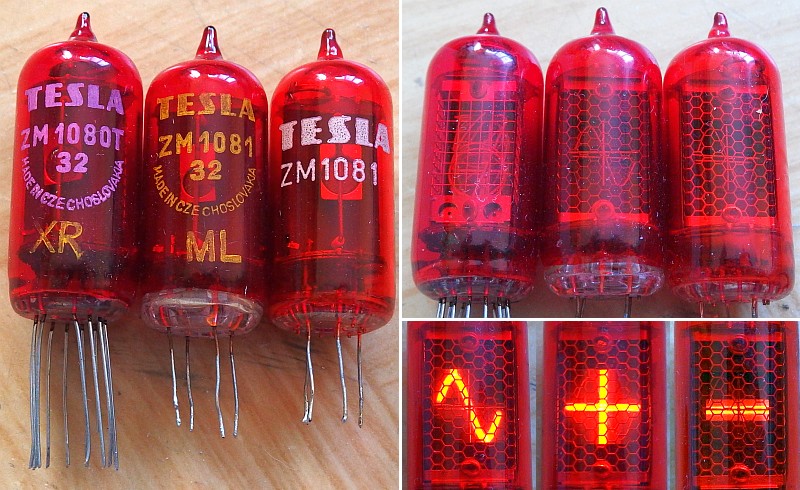
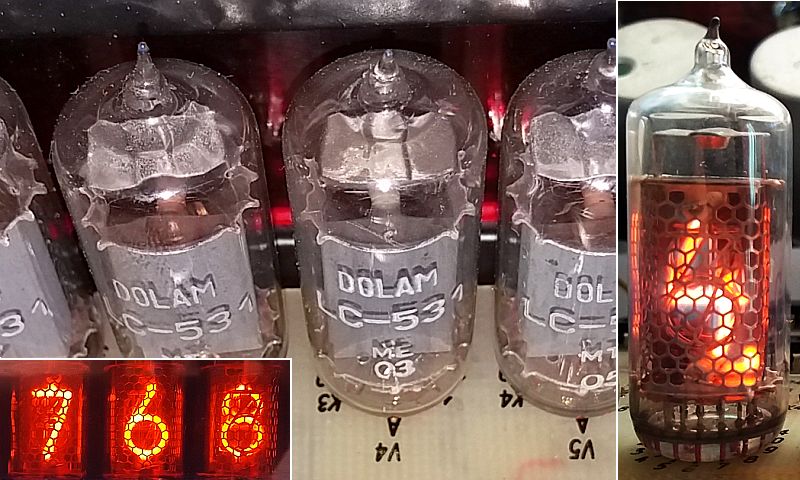
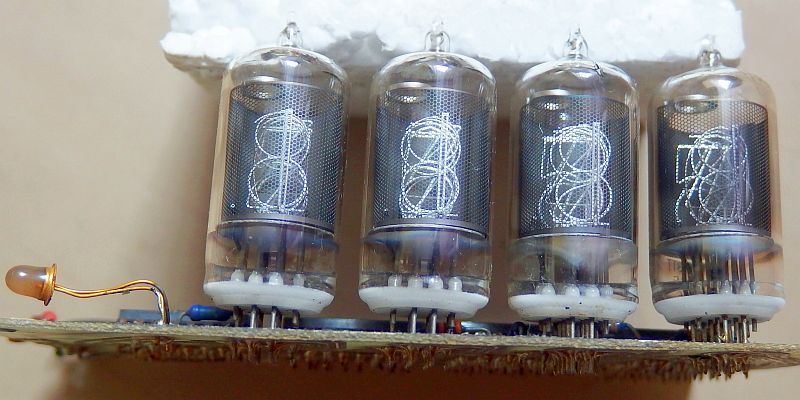
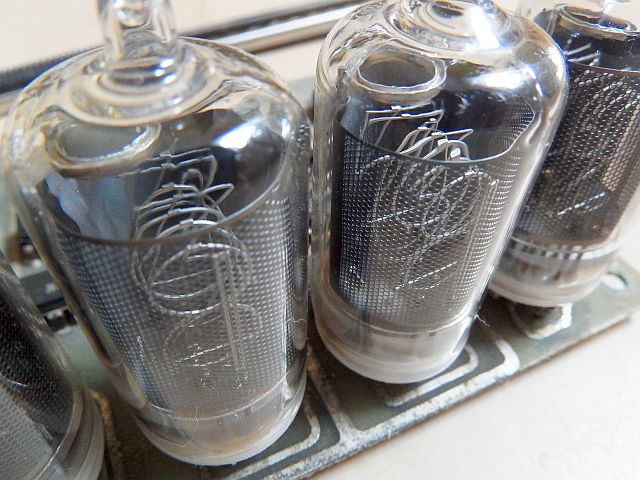
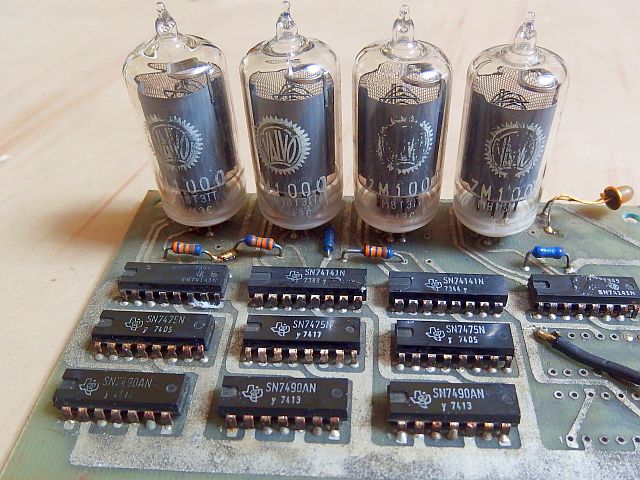
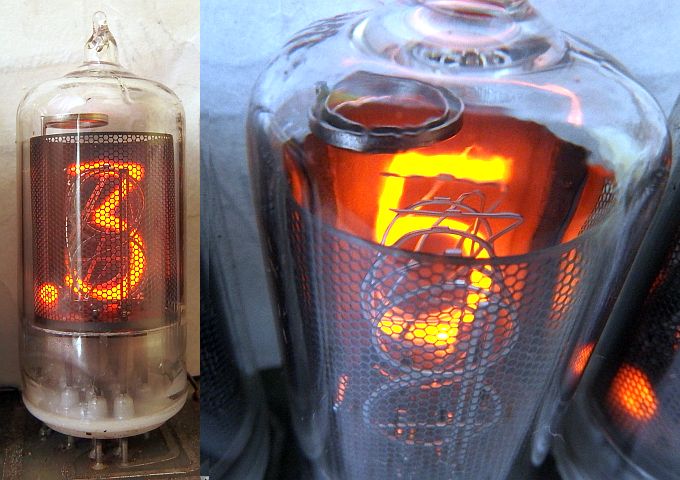
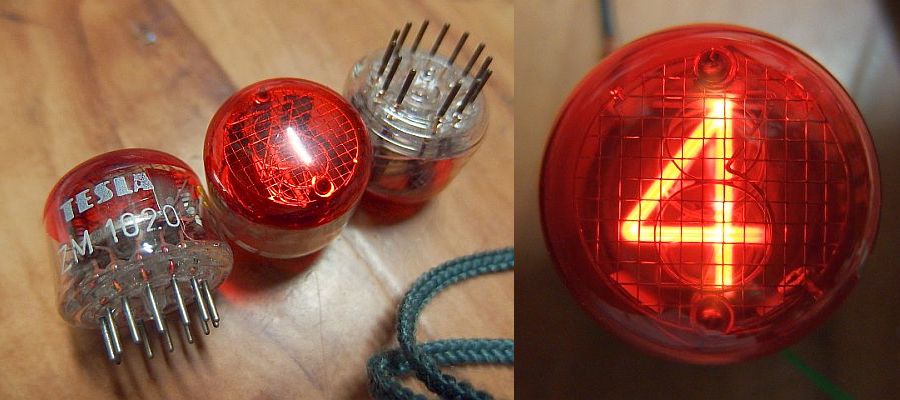
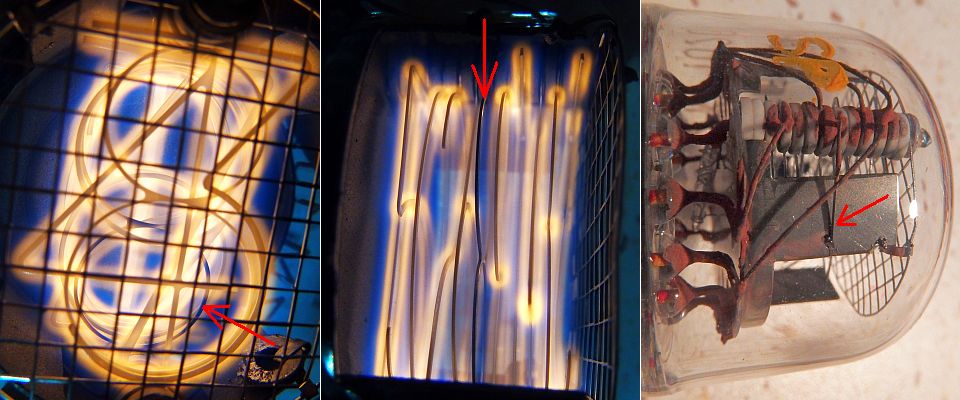
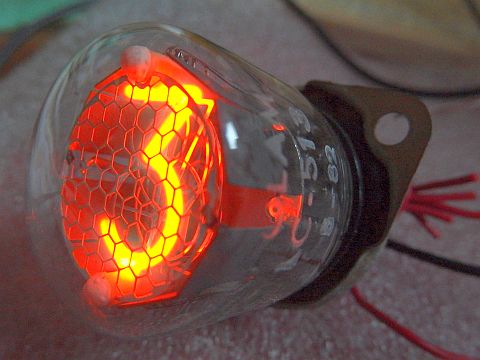
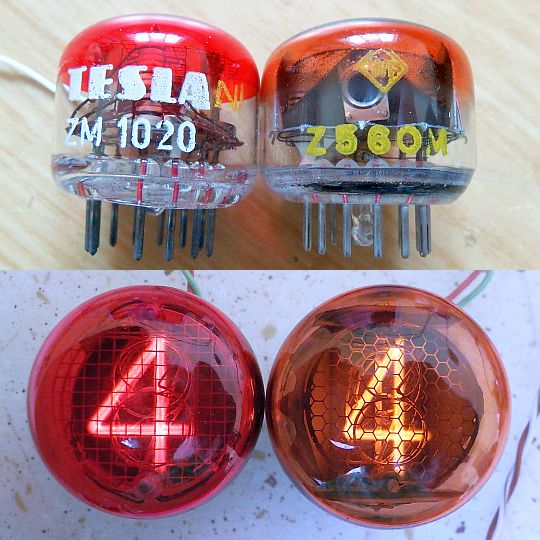
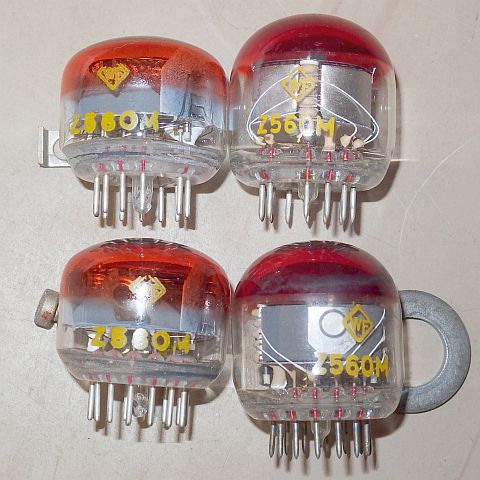
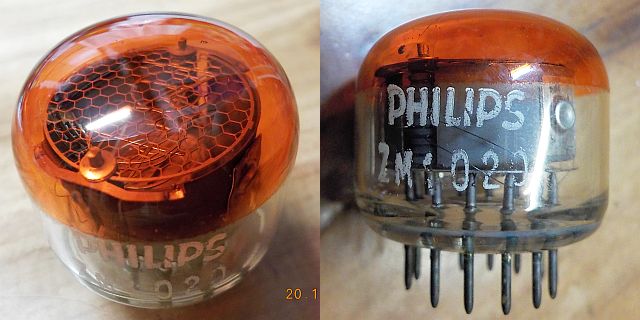
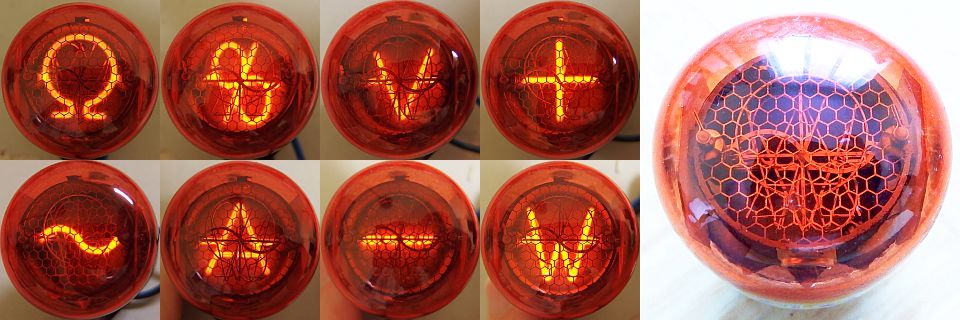
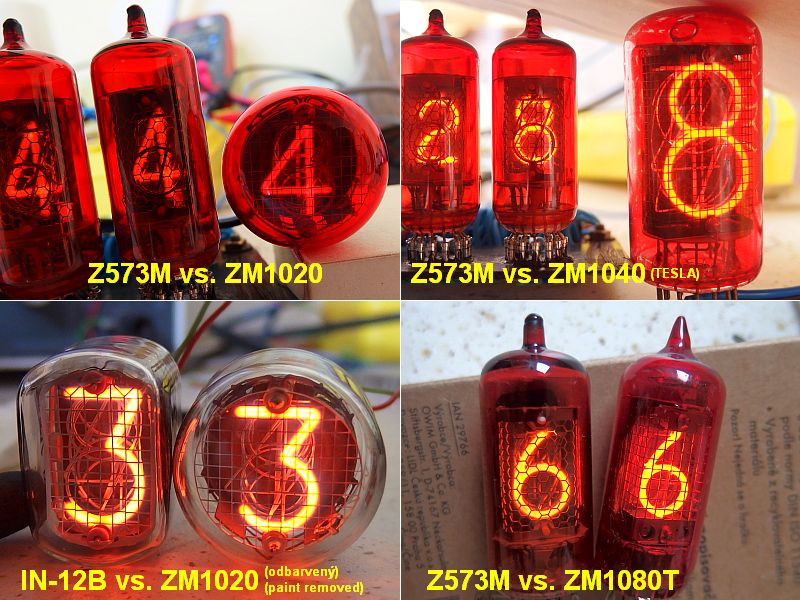
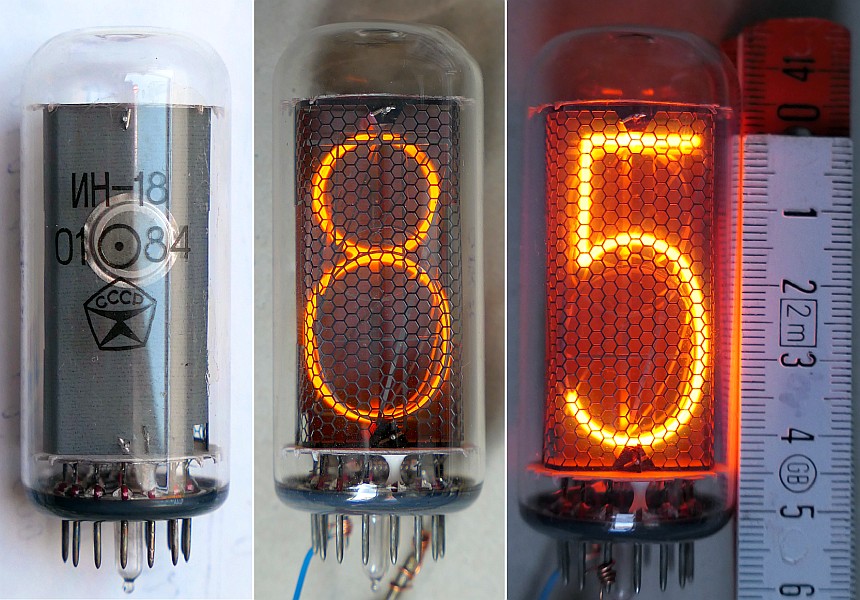
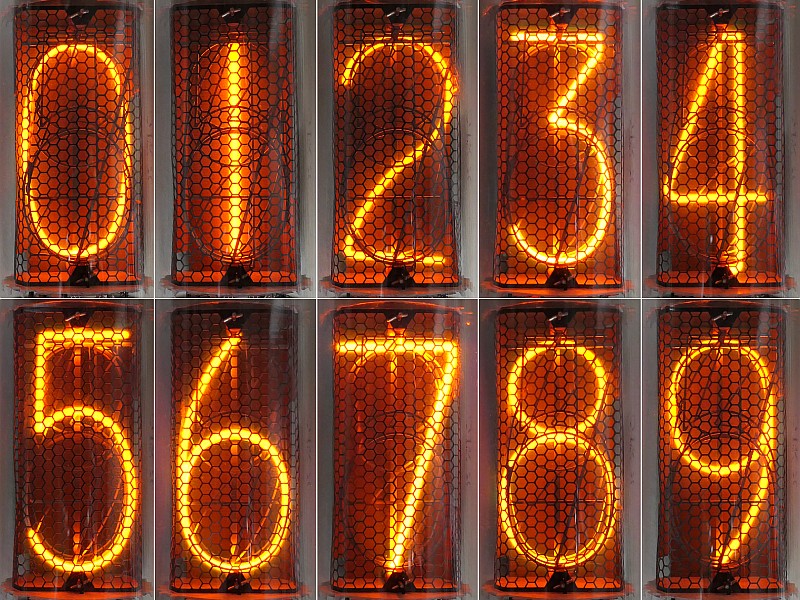
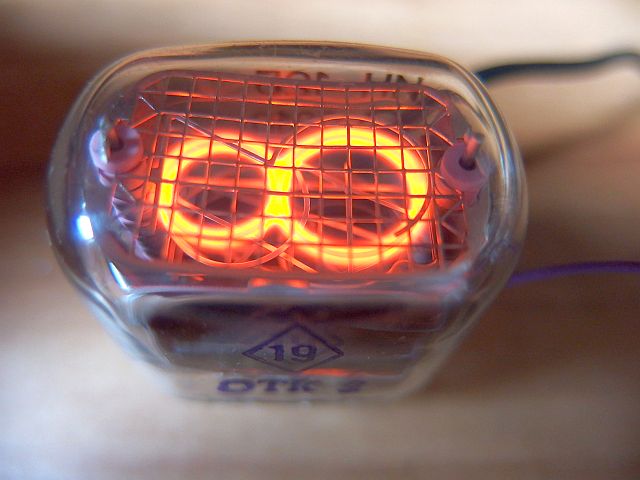
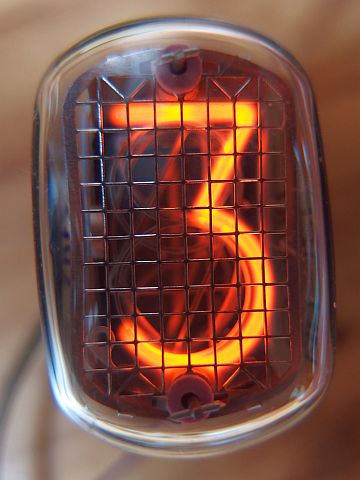
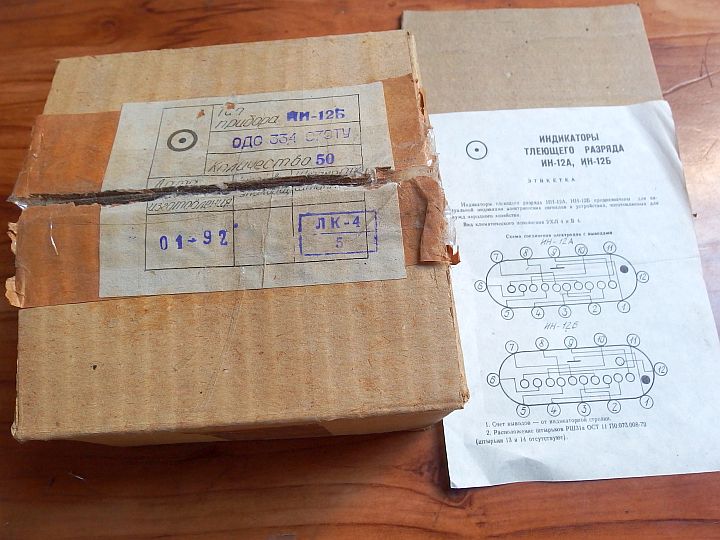
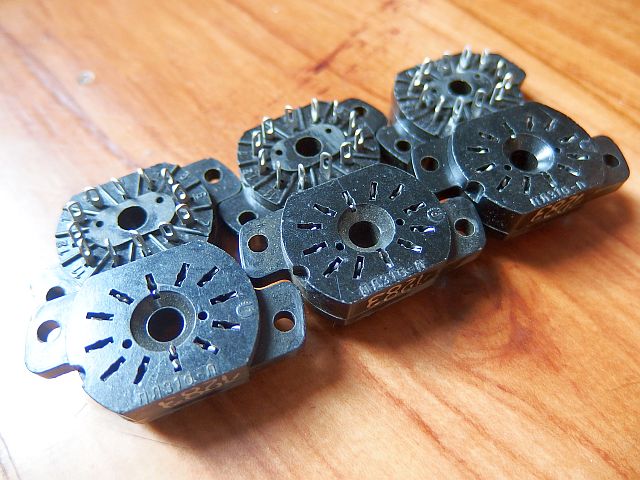
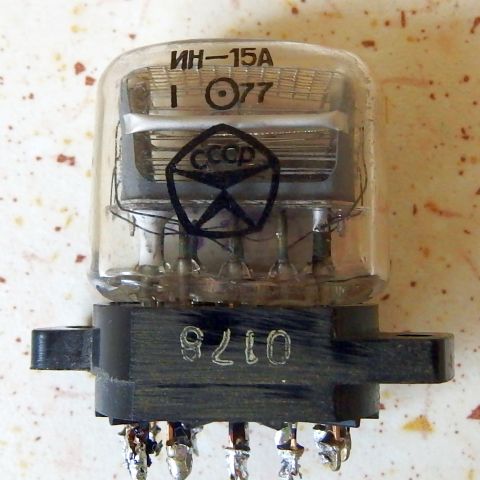
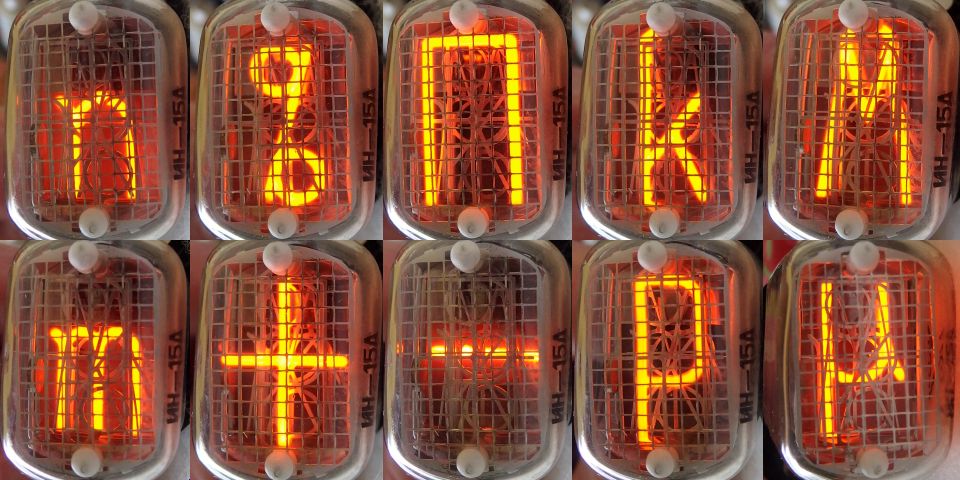
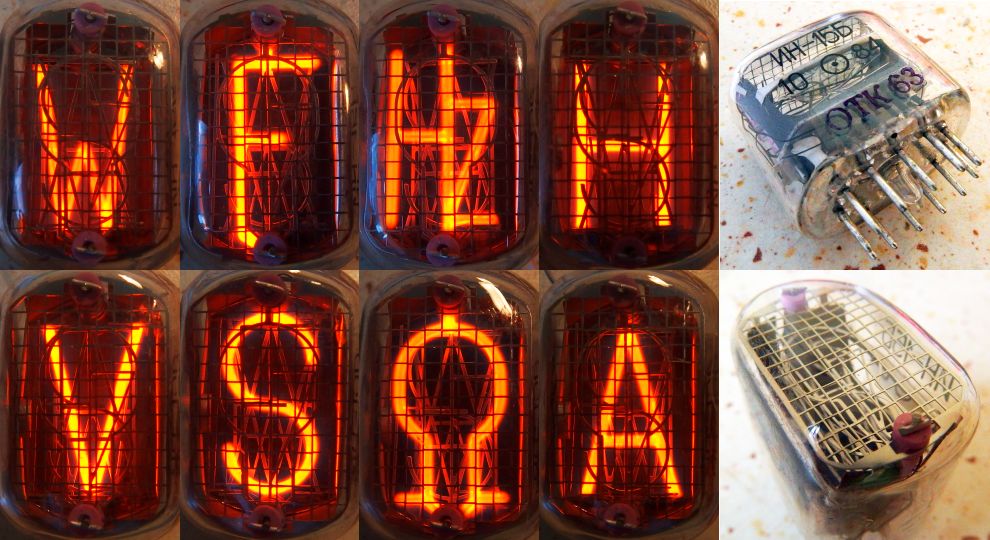
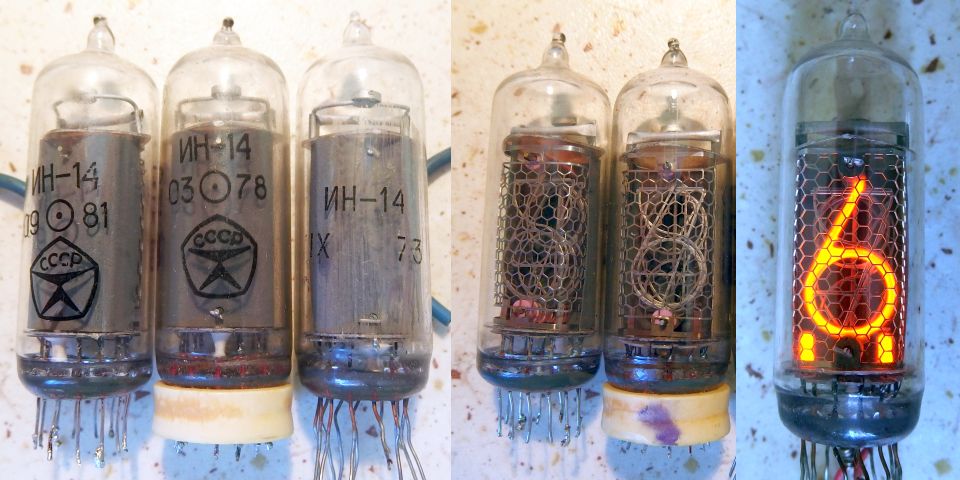
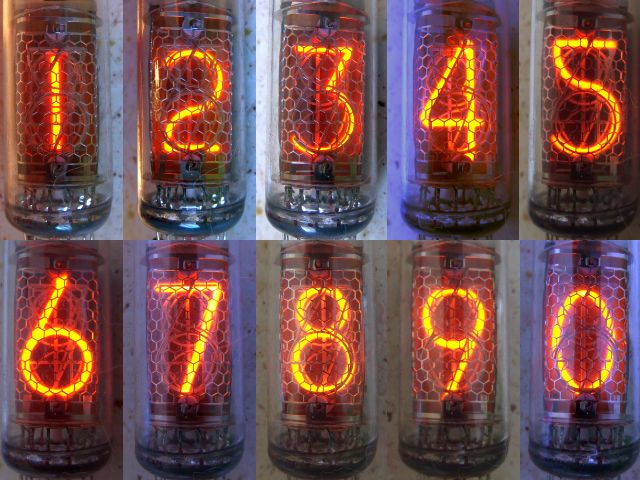
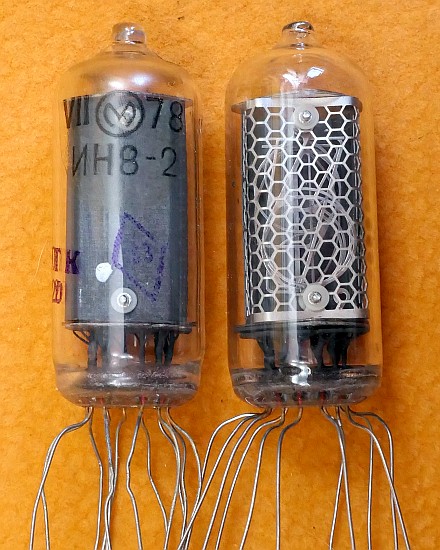
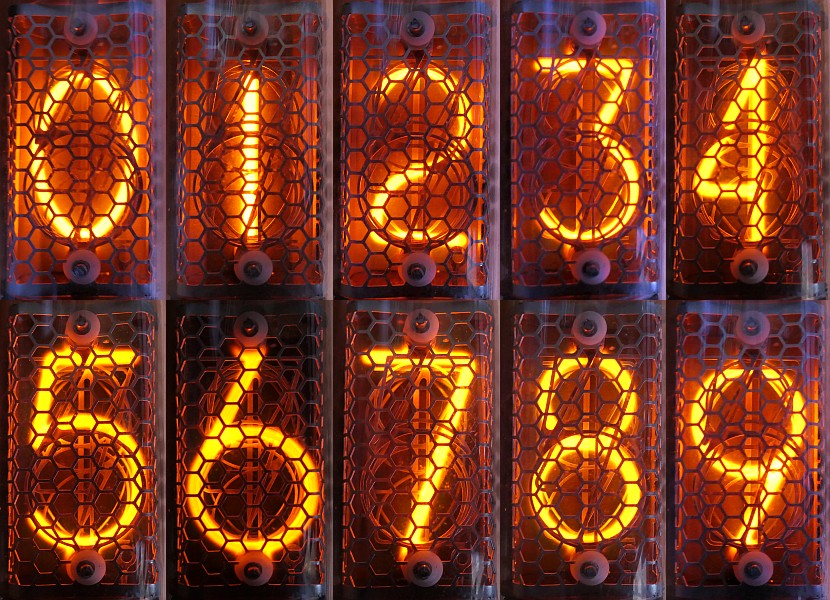
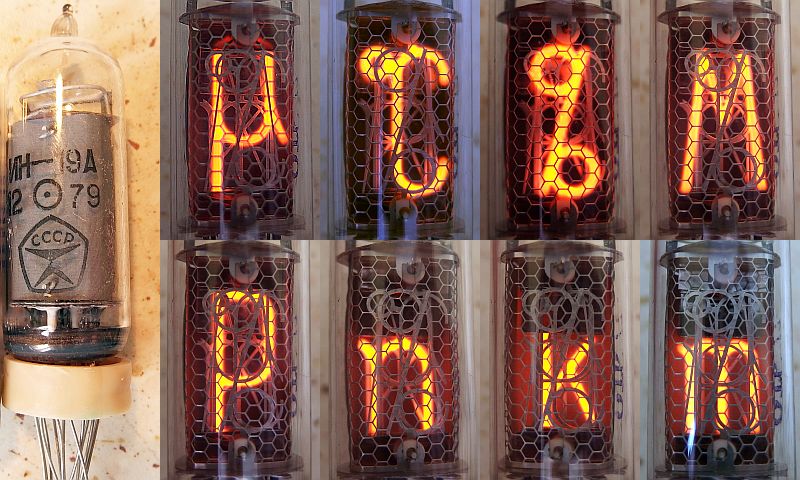
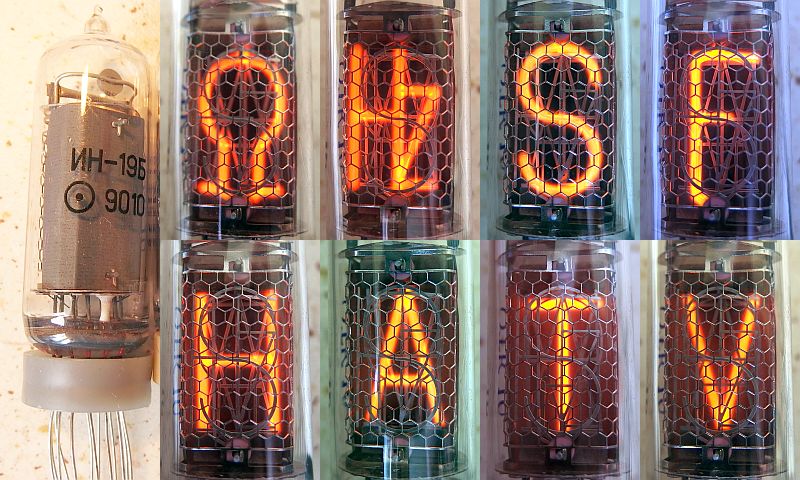
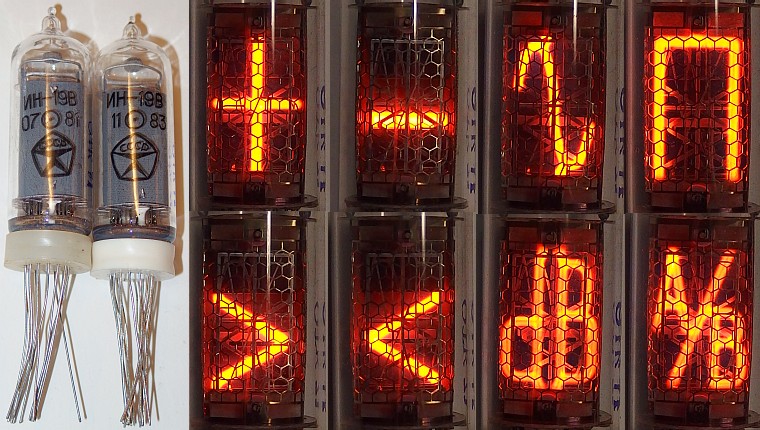
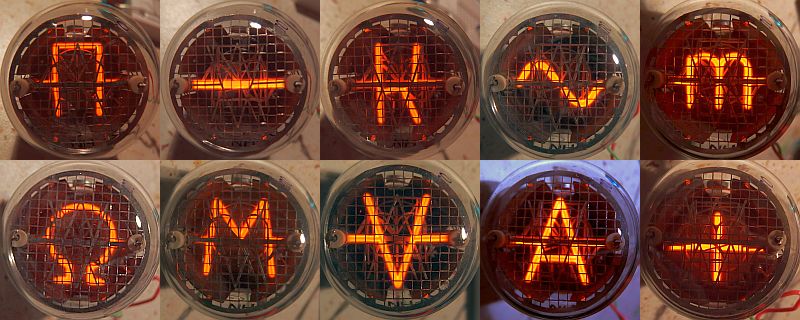
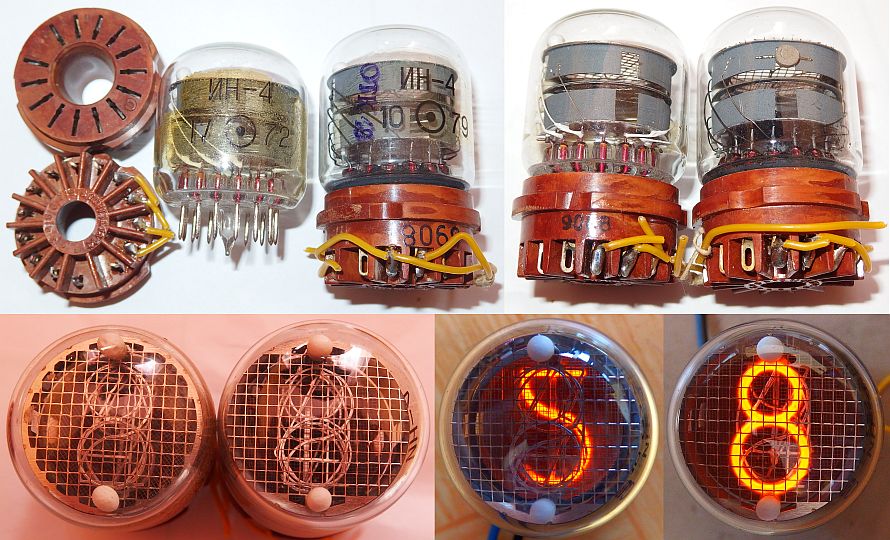
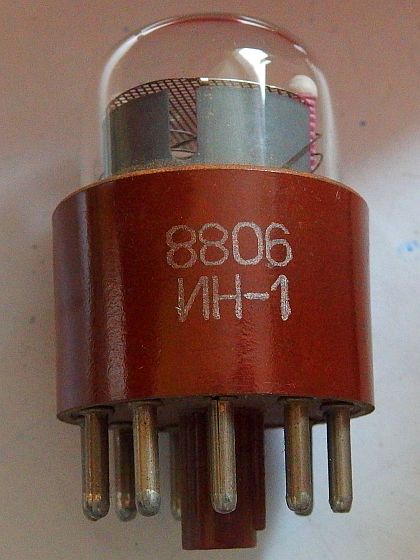
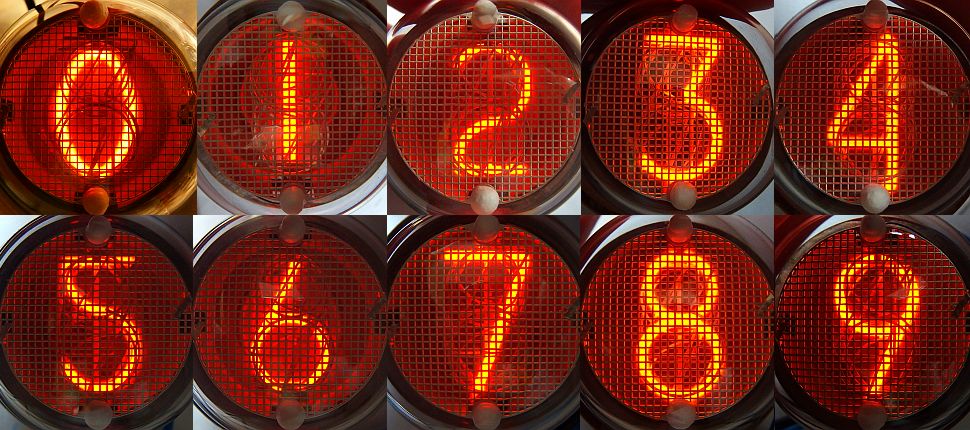

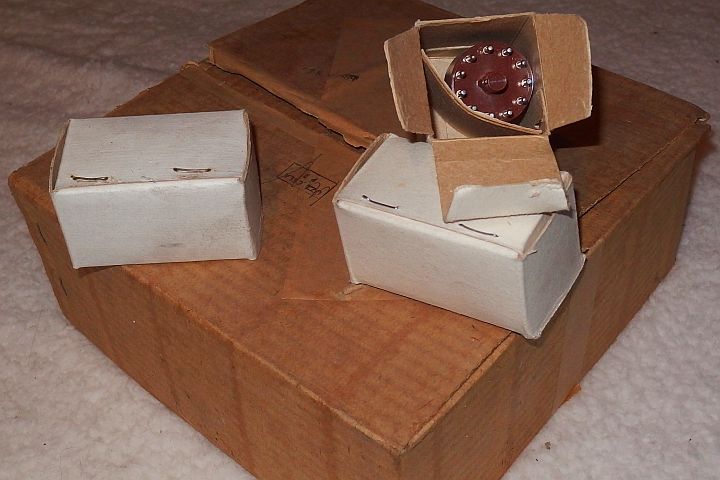
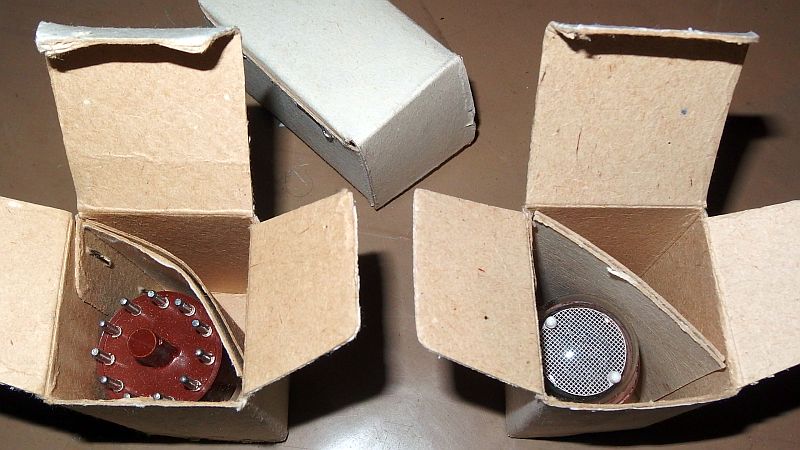
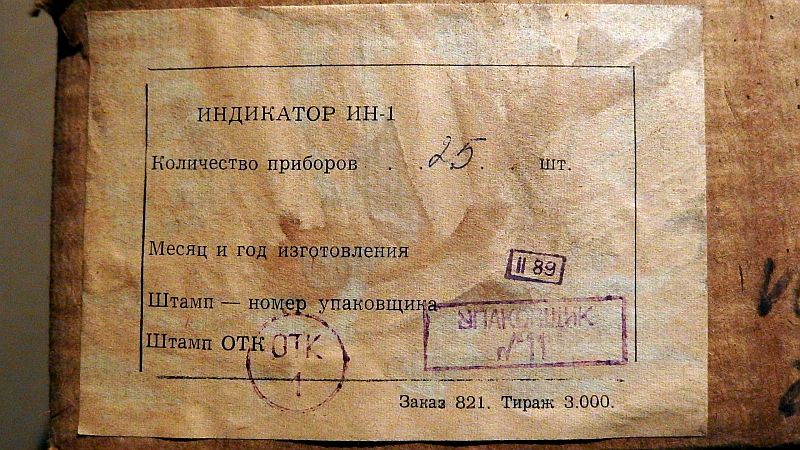
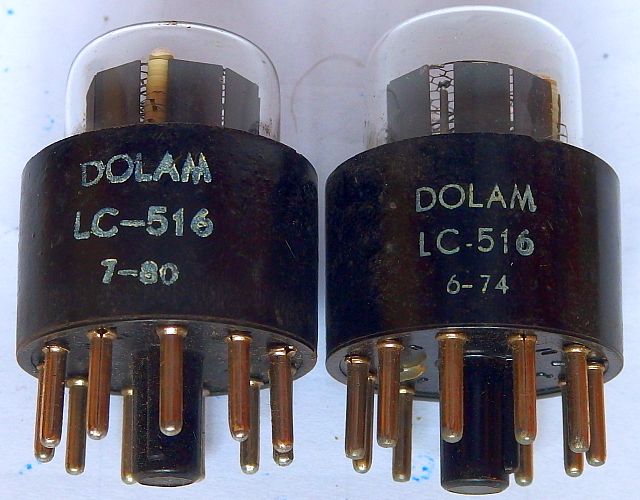
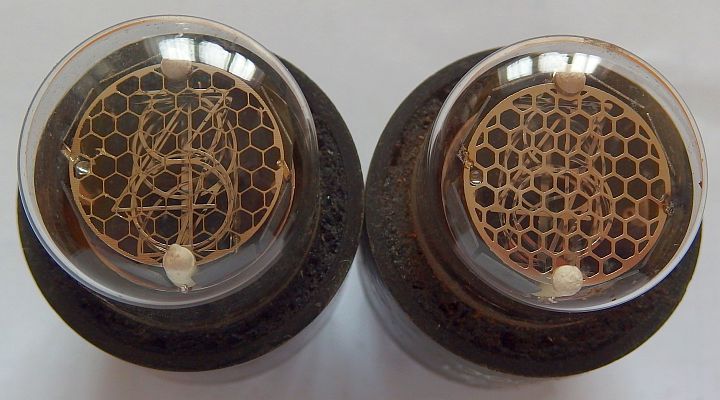
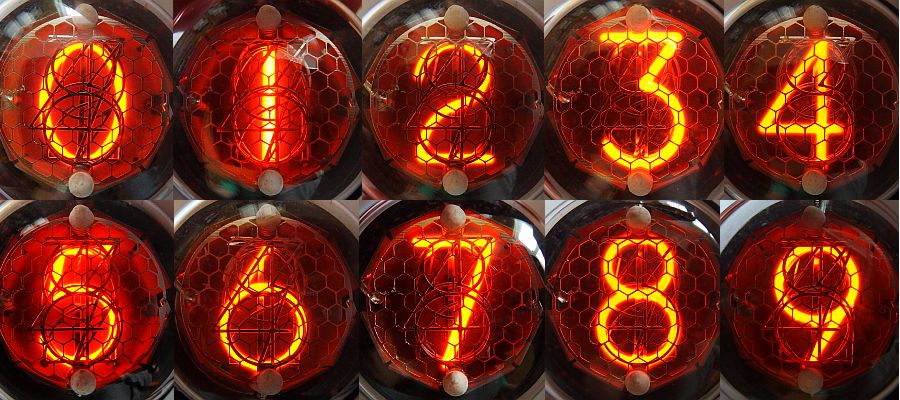
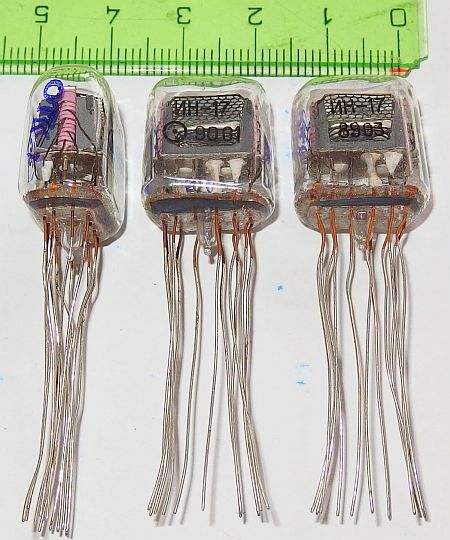
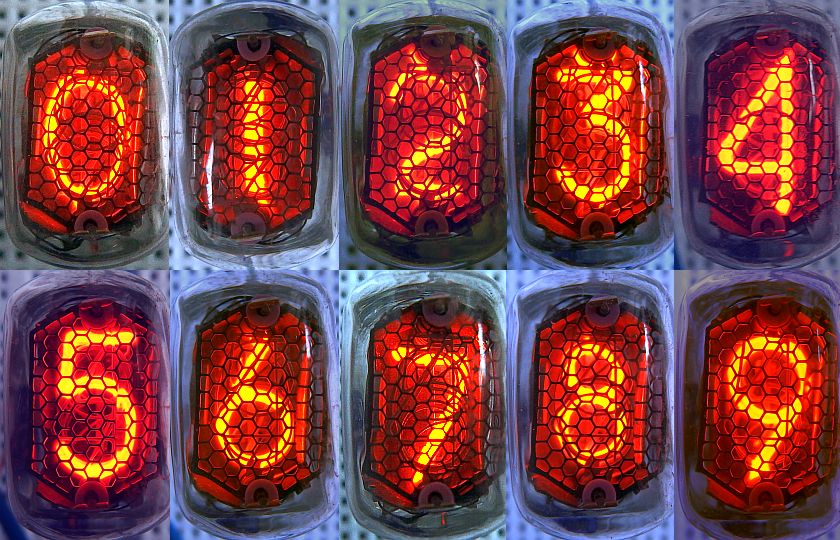
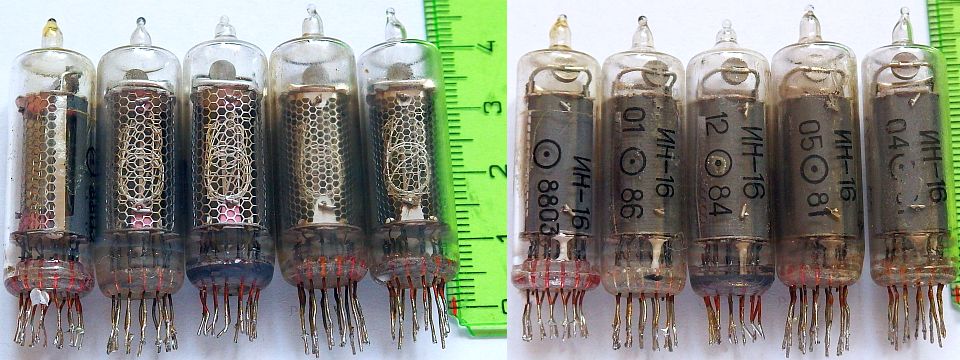
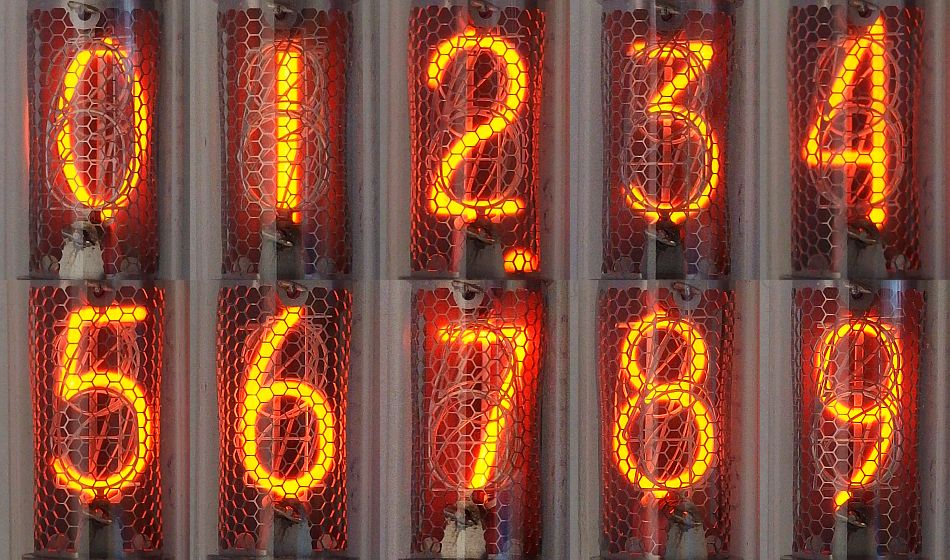
| Type | Height of digit | Displays | Life time | Note |
|---|---|---|---|---|
| IN-1 (ИН-1) | 18 mm | 0...9 | min. 1000 h | . |
| IN-2 (ИН-2) | 9 mm | 0...9 | min. 1000 / 5000 h | 1) |
| IN-4 (ИН-4) | 17 mm | 0...9 | min. 1000 h | . |
| IN-5A, IN-5A-1, IN-5B, IN-5B-1 (ИН-5А, ИН-5А-1, ИН-5Б, ИН-5Б-1) | 9 mm | Symbols | min. 1000 h | . |
| IN-7, IN-7A, IN-7B (ИН-7, ИН-7А, ИН-7Б) | 16 mm | Symbols | min. 1000 h / 800 h (A) / 400 h (B) | . |
| IN-8, IN-8-2 (ИН-8, ИН-8-2) | 18 mm | 0...9 (",") | min. 5000 / 10 000 h | 1) |
| IN-12A, IN-12B (ИН-12А, ИН-12Б) | 18 mm | 0...9 (",") | min. 5000 / 7500 h | 1) |
| IN-14 (ИН-14) | 18 mm | 0...9 ", ," | min. 5000 / 12 500 h | 1) |
| IN-15A, IN-15B (ИН-15А, ИН-15Б) | 18 mm | Symbols | min. 1000 h (A) / 800 h (B) | . |
| IN-16 (ИН-16) | 13 mm | 0...9 ", ," | min. 5000 h | . |
| IN-17 (ИН-17) | 9 mm | 0...9 | min. 7500 / 9000 h | 1) |
| IN-18 (ИН-18) | 40 mm | 0...9 | min. 2000 / 5000 h | 1) |
| IN-19A, IN-19B, IN-19V (ИН-15А, ИН-15Б, ИН-15В) | 18 mm | Symbols | min. 3000 / 5000 h | 1) |
| Type | Manufacturer | Base | View | Color | Digit height | Displays | Decimal point | Life expectancy | Note |
|---|---|---|---|---|---|---|---|---|---|
| Z522M | RFT ?, Valvo | into socket | side | red | 30 mm | 0...9 | none | ? | old, similar to ZM1040, Z566M |
| Z5220M | RFT ?, Valvo | into socket | side | clear | 30 mm | 0...9 | none | ? | clear version of Z522M, old, similar to ZM1042, Z5660M |
| Z560M | RFT | into socket | top | red | 15,5 mm | 0...9 | none | ? | similar to ZM1020 |
| Z5600M | RFT | into socket | top | clear | 15,5 mm | 0...9 | none | ? | clear version of Z560M, similar to ZM1022 |
| Z561M | RFT | into socket | top | red | . | W - A ~ + V % Ω | none | ? | . |
| Z5610M | RFT | into socket | top | clear | . | W - A ~ + V % Ω | none | ? | clear version of Z561M |
| Z566M | RFT | into socket | side | red | 30 mm | 0...9 | none | ? | similar to ZM1040 |
| Z5660M | RFT | into socket | side | clear | 30 mm | 0...9 | none | ? | clear version of Z566M, similar to ZM1042 |
| Z567M | RFT | into socket | side | red | . | + - ~ | none | ? | Symbol tube for Z566M |
| Z5670M | RFT | into socket | side | clear | . | + - ~ | none | ? | clear version of Z567M, Symbol tube for Z5660M |
| Z568M | RFT | into socket | side | red | 50 mm | 0...9 | none | ? | . |
| Z5680M | RFT | into socket | side | clear | 50 mm | 0...9 | none | ? | clear version of Z568M |
| Z570M | RFT | wires | side | red | 13 mm | 0...9 | none | ? | similar to ZM1080 |
| Z5700M | RFT | wires | side | clear | 13 mm | 0...9 | none | ? | clear version of Z570M, similar to ZM1082 |
| Z571M | RFT | wires | side | red | . | + - ~ | none | ? | Symbol tube for Z570M, Z573M, Z574M |
| Z5710M | RFT | wires | side | clear | . | + - ~ | none | ? | clear version of Z571M, Symbol tube for Z5700M, Z5730M, Z5740M |
| Z573M | RFT | wires | side | red | 13 mm | 0...9 | right | ? | . |
| Z5730M | RFT | wires | side | clear | 13 mm | 0...9 | right | ? | clear version of Z573M |
| Z574M | RFT | wires | side | red | 13 mm | 0...9 | left | ? | . |
| Z5740M | RFT | wires | side | clear | 13 mm | 0...9 | left | ? | clear version of Z574M |
| Z580M | RFT | wires | side | red | . | K M G T m μ n p | none | ? | Symbol tube for Z570M, Z573M, Z574M |
| Z5800M | RFT | wires | side | clear | . | K M G T m μ n p | none | ? | clear version of Z580M, Symbol tube for Z5700M, Z5730M, Z5740M |
| Z581M | RFT | wires | side | red | . | A Hz F H s S Ω V | none | ? | Symbol tube for Z570M, Z573M, Z574M |
| Z5810M | RFT | wires | side | clear | . | A Hz F H s S Ω V | none | ? | clear version of Z581M, Symbol tube for Z5700M, Z5730M, Z5740M |
| Z590M | RFT | wires | side | red | 10 mm | 0...9 | left and right | ? | . |
| Z5900M | RFT | wires | side | clear | 10 mm | 0...9 | left and right | ? | clear version of Z590M |
| Z870M | RFT | into socket | side | red | 15.5 mm | 0...9 | none | ? | Bi-quinary, similar to ZM1030 |
| Z8700M | RFT | into socket | side | clear | 15.5 mm | 0...9 | none | ? | clear version of Z870M, Bi-quinary, similar to ZM1032 |
| Type | Manufacturer | Base | View | Color | Digit height | Displays | Decimal point | Life expectancy | Note |
|---|---|---|---|---|---|---|---|---|---|
| ZM1000R | Valvo, Philips, Amperex ... | into socket | side | red | 14 mm | 0...9 | left | 100 000 h | Red version of ZM1000 |
| ZM1000 | Valvo, Philips, Amperex ... | into socket | side | clear | 14 mm | 0...9 | left | 100 000 h | Clear version of ZM1000R |
| ZM1020 | Tesla and others | into socket | top | red | 15,5 mm | 0...9 | none | 100 000 h | similar to Z560M |
| ZM1022 | Mullard, Valvo, Telefunken ... | into socket | top | clear | 15,5 mm | 0...9 | none | 100 000 h | clear version of ZM1020, similar to Z5600M |
| ZM1030 | Tesla and others | into socket | side | red | 15,5 mm | 0...9 | none | 50 000 h | Bi-quinary, similar to Z870M |
| ZM1032 | Valvo, Amperex ... | into socket | side | clear | 15,5 mm | 0...9 | none | 50 000 h | clear version of ZM1030, bi-quinary, similar to Z8700M |
| ZM1040 | Tesla and others | into socket | side | red | 31 mm | 0...9 | none | 20 000 h / 100 000 h | 1), similar to Z566M |
| ZM1042 | Tesla and others | into socket | side | clear | 31 mm | 0...9 | none | 20 000 h / 100 000 h | 1), similar to Z5660M, clear version of ZM1040 |
| ZM1080 | Telefunken, Mullard, Philips, Valvo ... | wires | side | red | 13 mm | 0...9 | none | 30 000 h | similar to Z570M |
| ZM1082 | Telefunken, Mullard, Philips, Valvo ... | wires | side | clear | 13 mm | 0...9 | none | 30 000 h | clear version of ZM1080, similar to Z5700M |
| ZM1080T | Tesla | wires | side | red | 13 mm | 0...9 | left and right | ? | can replace Z570M, Z573M and Z574M |
| ZM1082T | Tesla | wires | side | clear | 13 mm | 0...9 | left and right | ? | clear version of ZM1080T |
| Type | Manufacturer | Base | View | Color | Digit height | Displays | Decimal point | Life expectancy | Note |
|---|---|---|---|---|---|---|---|---|---|
| LC-513 | Dolam | into socket | top | clear | 15,5 mm | 0...9 | left | ? | similar to ZM1022, Z5600M |
| LC-516 | Dolam | into socket | top | clear | 15,5 mm | 0...9 | none | ? | similar to IN-1 |
| LC-531 | Dolam | wires | side | clear | 13 mm | 0...9 | left and right | ? | similar to ZM1082T |
| LC-631 | Dolam | into socket | side | clear | 30 mm | 0...9 | none | ? | similar to Z5660M, Z5220M, ZM1042 |